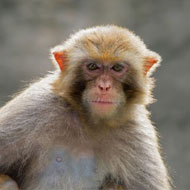BVA stance on primates as pets

BVA concludes very few private owners can meet the needs of pet primates.
The BVA is calling for the government to implement a ban on the keeping of primates as pets, after it has concluded it is 'almost impossible' for private owners to meet the needs of these animals to the extent laid down in the Animal Welfare Act 2006.
Views on the issue were sought from BVA members after it was revealed that a government inquiry had been launched into pet primate keeping in the UK.
Evidence was sought by the Environmental, Food and Rural Affairs (Efra) Committee on certain key issues, including whether primates should be kept as pets.
After consulting with its members, the BVA has concluded that the complex needs of primates are unlikely to be met by private individuals.
The association's president, Robin Hargreaves, explained: "Primates cannot be kept on their own. They need at least one companion in order to express natural behaviour. They require both an indoor and outdoor enclosure to ensure adequate exercise and exposure to UV light, and each species has specific dietary requirements.
"These animals are not domesticated companions like dogs and cats, or even livestock, and are extraordinarily difficult to care for properly. Very few people can provide the necessary resources to meet their welfare needs."
However, it is recognised that a ban could not be immediately enforced and a suitable transition period would be required to ensure appropriate accommodation could be secured for existing pet primates.
While it was considered that changes to existing legislation and licensing could improve primate welfare, the BVA says its members did not feel these options went far enough.
Mr Hargreaves added: "We appreciate that many people who keep primates privately care deeply for their pets and do their utmost to provide for them appropriately.
"However, primates are long-lived, intelligent, socially complex animals and we can think of no circumstances where they would benefit from being kept as a pet."
The BVA has recommended, however, that individuals who are working with accredited zoos should be allowed to breed primates for conservation purposes.
The Efra Committee consultation period closed yesterday (January 14). Evidence was also sought on the extent of the keeping and trade of primates in the UK, whether existing legislation is sufficient to protect welfare and whether it is being applied effectively.



 The RCVS has announced a new version of its 1CPD mobile app, with enhanced features for veterinary surgeons and veterinary nurses to record their continuing professional development.
The RCVS has announced a new version of its 1CPD mobile app, with enhanced features for veterinary surgeons and veterinary nurses to record their continuing professional development.